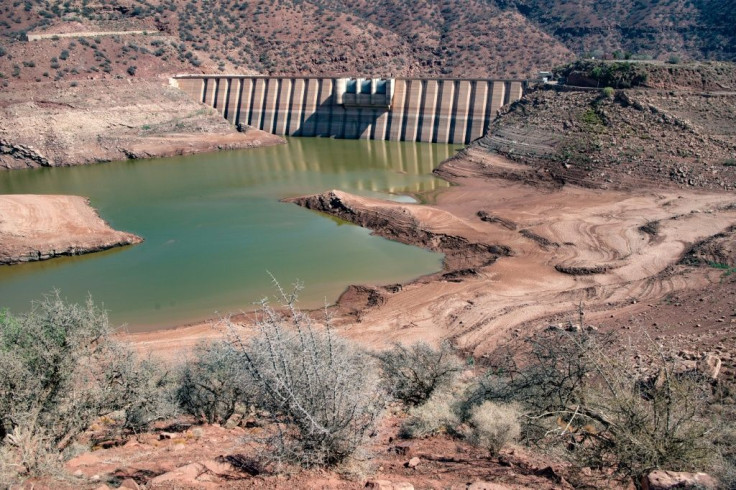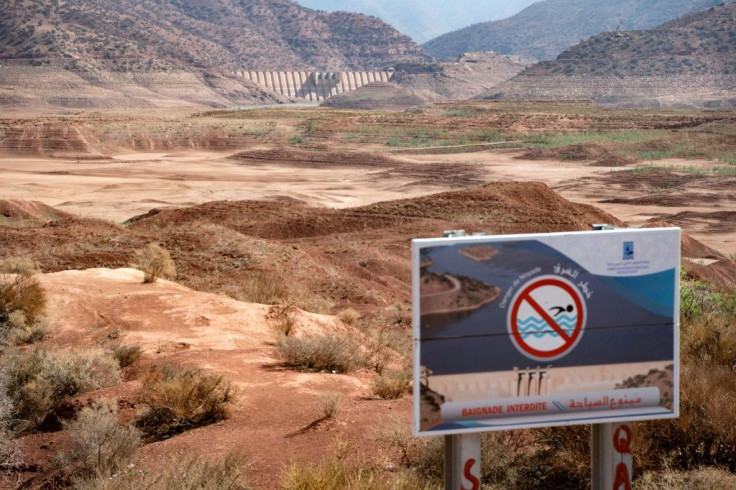Drought Casts Shadow Over Prime Moroccan Farming Land
Parched fields stretch as far as the eye can see on plains overlooking Agadir in southwestern Morocco, as precious water resources are diverted from the drought-hit agricultural heartland to households.
"These trees are nearly 20 years old -- they're dead, there is no longer any water," sighed Ahmed Driouch, a farmer, his withered orange trees testament to three years of intensifying drought.
For the past three years, the region has been struggling with a drought that exacerbated water resources and prompted authorities to make a painful choice.
They have increasingly resorted to diverting water from dams in the region to residential areas, depriving farms of irrigation to provide a drinkable supply to nearly a million Moroccans.
"I don't understand why they haven't sought another way of providing drinking water, other than by marginalising farmers," lamented Driouch.

Water levels in reservoirs stood at an average of 37 percent of capacity across Morocco at the end of October, down from nearly 46 percent a year ago.
Around Agadir, the coastal capital of the Souss-Massa region, water levels are even lower, spelling disaster for citrus fruits and seasonal vegetables.
"The shortfall in surface water is 94 percent," said Abdelhamid Aslikh, head of the region's water reserves agency. "We have never seen anything like this... it's worrying."
Shortages are so severe that Agadir's tap water is cut off to households overnight -- a measure that has reduced wastage to a degree, according to Aslikh.
He said the authorities have also forbidden "irrigation of golf courses and hotel gardens with drinkable water" in Agadir, and encouraged the use of treated waste-water as an alternative.

Some 60 kilometres (around 40 miles) from Agadir, the Abdelmoumen dam -- normally popular with local bathers -- has run almost dry.
Weeds have sprung up, while the famous argan trees that dot the foothills of the nearby Lesser Atlas mountains have lost their lustre.
The dam has not irrigated agricultural land since 2017.

On the other side of the mountains, olive groves are parched, aside from the few that are served by wells.
Without irrigation via the dams, farmers have little choice but to await rare rains, or to exhaust a water table that has been increasingly overexploited in recent years.
Water drawn from wells is in any case "salty" and therefore unsuitable for many crops, said another farmer, Abderrahmane.
He relied on reservoir water for years before he was forced to reduce his farming activity to just a fraction of his land.
"I have never seen drought like this before," Abderrahmane lamented, his gazed fixed on desiccated cacti.
The ban on using dam water to irrigate farms extends to the regions of Marrakesh and El Jadida, according to the agriculture ministry, which warns that access will not be restored until water levels rise.
Haidar, 25, normally grows herbs such as coriander and parsley on a small plot of rented land, but has thrown in the towel this year.
In the absence of irrigation from the reservoirs, he cannot afford to purchase water from owners of wells, so now trades vegetables in an increasingly desperate bid to support his family.
But "the current situation is not down to climatic conditions," Haidar told AFP.
"It is instead the result of irrational crop-growing that has drained water" to an excessive degree, he argued, blaming "water-intensive" fruit and vegetables.
Tomatoes and citrus fruits, widely grown in the region, require a lot of water.
Morocco's economy depends heavily on agriculture, which accounts for nearly 15 percent of Gross Domestic Product, ahead of tourism and industry.
In 2008, Morocco launched an ambitious agricultural strategy, dubbed the Green Morocco Plan, in a bid to boost small-scale farmers' productivity and revenues.
It "saved some two billion cubic metres of irrigation water", the agriculture ministry claims.
The authorities are now pinning their hopes on the planned opening of seawater desalination plant in Agadir.
Set to open in April next year, the facility should plug the deficit in drinking water and allow irrigation of at least some agricultural land to restart.
© Copyright AFP {{Year}}. All rights reserved.





















